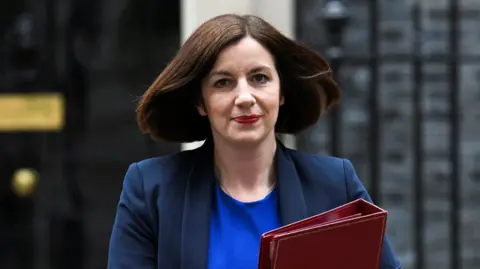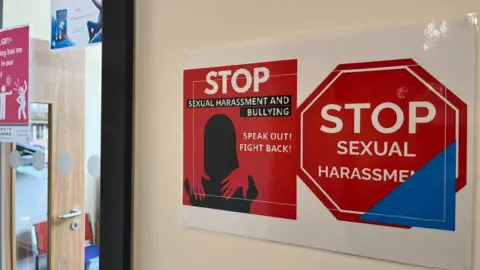Bridget Phillipson defends lack of sex education age limits
 Reuters
ReutersEducation Secretary Bridget Phillipson has defended not using age limits in the government's new guidance around sex education in England.
Speaking to the BBC, Phillipson said sometimes it might be necessary "to broach a topic a little bit sooner" in school, but that parents would be consulted.
Earlier draft guidance by the previous Conservative government, published before last year's election, had proposed setting age limits around sex education, which ministers at the time said should not be taught before Year 5.
Shadow Education Secretary Laura Trott said the Conservatives' earlier draft version of the guidance would have "prevented under-nines being taught about sex".
The government's new relationships, sex and health education (RSHE) guidance says schools should "proactively" engage with parents to ensure they are aware of what is being taught.
"The guidance is very clear that parents should be able to see that material and the parents should be consulted about what their children are being taught as well," Phillipson told the BBC.
"It's a big worry some of the emerging technology around deepfakes and AI and this is an area where parents often struggle to keep pace because the technology moves so fast.
"Our children, however, they always know what's going on online, and this is about equipping young people with the tools they need."
Head teacher unions have said they are pleased to see that there are no age limits included.
What does the new guidance say?
The government has outlined areas that should be introduced in primary school and what students should know by the end of secondary school.
The Department for Education (DfE) says this approach will ensure that children are not taught content they are too young to understand - without assigning specific ages to individual topics.
It requires primary schools to teach respectful relationships, boundaries and the risks of sharing information and images online.
And it recommends that conception, birth and puberty is taught in Year 5 or Year 6 - but this will not be compulsory.
Primary school teachers may also choose to discuss the sharing of naked images or online sexual content if it is affecting their pupils, or if they know that students have seen pornography.
By the end of secondary school, students should be taught how to keep themselves and others safe, including how to avoid sexually transmitted infections and unplanned pregnancies.
Schools should also teach children how to recognise and act against misogyny - prejudice against women – and show pupils "how to identify and learn from positive male role models".
Additions in the secondary school curriculum from next year include lessons on:
- The sexual norms endorsed by so-called "involuntary celibates" (incels) or online influencers
- AI-generated sexual imagery and deepfakes
- How pornography links to misogyny
- Sexual ethics beyond consent and the awareness of power dynamics
Schools will begin implementing the changes this autumn and it will be legally binding from September 2026.
 Hope Rhodes / BBC
Hope Rhodes / BBCThe guidance will also advise secondary schools to work closely with mental health professionals on how to discuss suicide prevention in an age-appropriate way.
Andy Airey, Mike Palmer and Tim Owen - the fathers behind the Three Dads Walking campaign - who each lost a daughter to suicide, have welcomed this inclusion, saying it will "save lives".
Margaret Mulholland, a special educational needs and inclusion specialist at The Association of School and College Leaders told BBC Breakfast campaigns like theirs have been "incredibly helpful" in shaping updated guidance "informed not just by academic evidence but also by the data and life experiences of families".
She welcomed the "overdue" changes, saying that the statutory guidance "is now five years old" and "lagging behind life experiences of young people".
RSHE became compulsory in schools in England in 2020.
All pupils must take part in relationships education. This does not involve explaining the details of different sexual acts, but can include sensitive topics such as sexual violence, in order to keep children safe.
Parents have the right to request that their child be withdrawn from some or all of sex education, but students can choose to opt back in from three terms before they turn 16.
The government is expected to release separate guidance soon on how schools should support children who are gender-questioning.
 Hope Rhodes / BBC
Hope Rhodes / BBCAt Benton Park School in Leeds, head teacher Nik Skilton says teachers have to be "really careful" when discussing inappropriate online content with students, to avoid introducing ideas they may not yet have encountered.
"But, on the flip side, we've also got to make sure that we are supporting young people to protect themselves," he said.
Mr Skilton added that schools need some flexibility in how they approach these topics, as each school faces different issues.
The RSHE guidance will encourage schools to build a more positive culture, making both staff and pupils aware of the dangers of stereotypes and prejudice.
Since adopting a whole-school approach to these issues, Benton Park has seen a decrease in the number of students experiencing sexual harassment.
Nuraniya, one of the student ambassadors at the school, believes social media is fuelling sexism and sexual harassment because "they appear so much on everyone's pages, on their phones, that they think it's normalised".
She says it has become much easier to "call it out" because of the skills the school has taught her.
Classmate Karman agrees, saying she now feels like she has a voice to say: "This is not okay".
